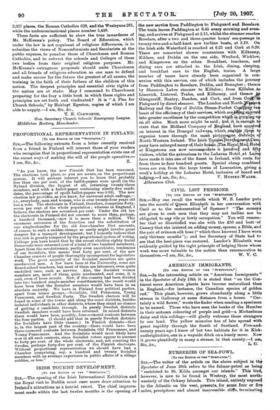PROPORTIONAL REPRESENTATION IN FINLAND.
[To THN EDITOR OP THZ " SPICOTATOR."] SIR,—The following extracts from a letter recently received from a friend in Finland will interest those of your readers who recognise that in proportional representation exists one of the surest ways of making the will of the people operative.— "As you know, the new Finnish Diet has been convened. The elections took place, as you are aware, on the proportional system. It will perhaps interest you to learn that probably less than one per cent. of the ballot-papers were spoilt (in the Nyland division, the largest of all, returning twenty-three members, and with a ballot-paper containing ninety-five candi- dates, the percentage of spoilt ballot-papers was 0.59). The new election law provides, as you know, for universal adult suffrage,- i.e., everybody, man and woman, who is over twenty-four years old has a vote. The electorate in Finland, therefore, comprises forty- seven per cent. of the whole population ; whereas in England, I believe, the electors are seventeen per cent. Under the old law the electorate in Finland did not amount to more than, perhaps, a hundred thousand,—now it is more than a million. This enormous extension of the franchise and the substitution of one single-chamber for the old four-chamber Diet amounts, of course, to such a sudden change as easily might involve great dangers for a tranquil development; but I honestly believe that this risk is greatly tempered by the proportional system of voting. Perhaps you have heard that by the recent election eighty Social Democrats were returned (out of a total of two hundred members). Apart from the revolutionary, partly even anarchistic, tendencies of our Socialists, this means that forty per cent, of the new Chamber consists of people thoroughly incompetent for legislative work. The great majority of the Socialist members are quite uneducated men. A. few have been at the University, some are Board-school teachers, but most of them are labourers, even quite unskilled ones, Buell as navvies. Also, the Socialist women members are, most of them, quite uneducated, and some, it is said, even of loose morals. Now, if the country had been divided into two hundred single-member constituencies, the result would have been that the Socialist members would have been in an absolute majority. We have in Finland four political parties, apart from minor groups,—Socialists, Old Fennoman, Young Fennoman, and Swedish Party. The Swedish electors will be found in some of the towns and along the coast districts, besides isolated individuals in other districts, where they stand no chance of getting a candidate through. In purely Swedish districts Swedish members would have been returned. In mixed districts there would have been, possibly, four-cornered contests between the four parties. (I should add that in purely Swedish districts the Socialists have little chance.) In Finnish districts—that is, in the largest part of the country—there would have been three-cornered contests between Socialists, Old Fennomans, and Young Fennomans. And the Socialists would most likely have won in all such contests, since Socialist voters appear to amount to forty per cent. of the whole electorate, and, not counting the Swedes, perhaps forty-five per cent. of the Finnish electorate. Without proportional representation we should have had a Chamber comprising, say, a hundred and twenty Socialist members with an average experience in public affairs of a village cobbler, or less."






































 Previous page
Previous page